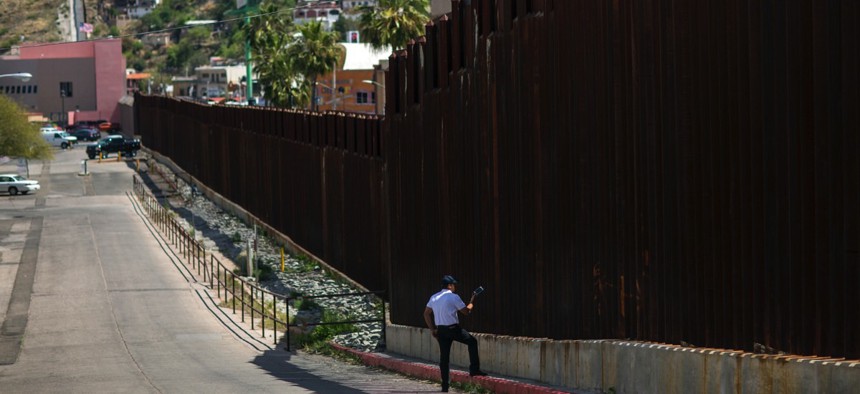DOJ Plows Ahead With Immigration Enforcement Despite Local Setbacks

A man in Nogales, Arizona, talks to his daughter and her mother who are standing on the other side of the border fence in Nogales, Mexico. Rodrigo Abd / AP Photo
Attorney General Jeff Sessions further attacked consent decrees with cities using the same arguments mayors make against co-opting police to act as immigration officers.
U.S. Attorney General Jeff Sessions directed federal prosecutors to prioritize immigration enforcement and “surged” 25 judges to border detention centers, one day after Immigration and Customs Enforcement temporarily suspended its Declined Detainer Outcome Report over local inaccuracies.
Speaking to Customs and Border Protection personnel at the country’s southwest border in Nogales, Arizona, which he dubbed “ground zero in this fight,” Sessions promised the detainment of all undocumented adults apprehended crossing into the U.S. and the expedited hiring of 50 immigration judges this year and 75 the next to reduce case backlogs.
The attorney general also credited President Trump with the “unprecedented” 40 percent decline in illegal border crossings from January to February down to a 17-year monthly low in March, despite the Department of Homeland Security’s hesitance to claim responsibility late last month.
“This is no accident,” Sessions said. “This is what happens when you have a president who understands the threat, who is not afraid to publicly identify the threat and stand up to it, and who makes clear to law enforcement that the leadership of their country finally has their back.”
For its part, local law enforcement in major cities, many of them declared sanctuary cities, has argued the Trump administration’s aggressive tactics enforcing immigration law have had a “chilling effect” on the community’s willingness to cooperate with police, report crimes and seek medical attention—especially Hispanics.
Counties and cities have further contested their inclusion in ICE’s weekly declined detainer report, intended to shame jurisdictions that fail to comply with warrantless requests to hold undocumented immigrants for longer than legally required by publishing those peoples’ crimes or charges irrespective of due process.
Enough jurisdictions complained to the point where ICE halted release of the report, pending a review.
“ICE remains committed to publishing the most accurate information available regarding declined detainers across the country and continues to analyze and refine its reporting methodologies. While this analysis is ongoing, the publication of the Declined Detainer Outcome Report (DDOR) will be temporarily suspended,” spokeswoman Sarah Rodriguez wrote Route Fifty in an email. “The DDOR has already sparked important conversations between ICE and law enforcement agencies across the nation, and the revised report will add to this discussion.”
Despite the setback and sanctuary cities’ research-backed assertions undocumented immigration makes them more, not less, safe, Sessions hasn’t softened his rhetoric—politicizing the deaths of those killed by undocumented immigrants and conjuring images of cartel violence caused by Los Zetas.
“When we talk about MS-13 and the cartels, what do we mean?” Sessions said. “We mean criminal organizations that turn cities and suburbs into war zones, that rape and kill innocent citizens and who profit by smuggling poison and other human beings across our borders.”
In addition to having federal prosecutors focus on the transportation or harboring of undocumented immigrants, Sessions told them to seek felony charges in the event of re-entry and prosecution when gang affiliation or a criminal history is evident. When document fraud or aggravated identity theft can be proven, the AG ordered prosecutors to seek the two-year minimum sentence.
The ideological shift from Black Lives Matter to Blue Lives Matter that has occurred under the Trump administration is evidenced by Sessions request that all 94 U.S. Attorneys offices make assault on federal law enforcement a chief concern. He also wants them all, border and interior, to designate an assistant U.S. attorney “border security coordinator” for their district to better coordinate the immigration enforcement response.
Later in the day, Sessions told the International Association of Chiefs of Police much the same at their divisional midyear conference in Litchfield Park, Arizona. He also took the time to address his review of all consent decree agreements the Department of Justice has with local police departments to reform them when systemic biased policing and use of force is discovered.
Sessions has advocated a hands-off approach to local police reform and consent decrees that doesn’t jive with his hands-on attempts to withhold grant funding from sanctuary cities.
“These decrees are not a silver bullet for solving the tough issues confronting some police departments,” Sessions said. “They make departments pull scarce resources and personnel away from crime-fighting in order to satisfy the demands of highly-paid monitors. I also have grave concerns that some provisions of these decrees reduce the lawful powers of police departments in ways that make cities less safe.”
The same could be said of coercing local law enforcement to enforce federal immigration law, which mayors have claimed.
Dave Nyczepir is a News Editor at Government Executive’s Route Fifty and is based in Washington, D.C.
NEXT STORY: State of Emergency in Florida as Fears of ‘Catastrophic’ Wildfires Grow






